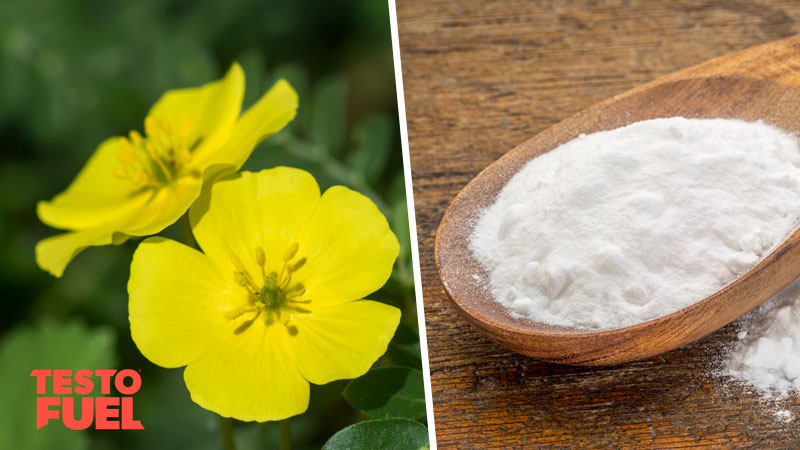TestoFuel Blog : Make Gains & Pack on the Muscle

One of these nutrients is a key player in the war against low testosterone. The other will just leave you low on cash and your hormone levels even lower.
When it comes to choosing a great testosterone booster, it’s all down to the ingredients.
Some will improve performance, health and libido in absolutely no time. Whereas others will leave you pondering why you still feel low on energy, sex drive and stamina.
D Aspartic acid vs tribulus.
Who wins the war of the testosterone boosting nutrients?
We break down the research and take a look at the science to find out…
More and more guys are suffering from low testosterone (T).
From the age of 30, your testosterone levels begin to decrease at an alarming rate of 1-2 % per year.
You might have enjoyed the benefits of high muscle mass, low body fat and the libido of a Bonobo ape while you were in your twenties. But as that forth decade creeps up on you, those benefits slowly start to side away.
There are 3 main factors that influence low testosterone:
According to US statistics, as many as 40% of men will suffer from clinically low testosterone levels by the time they hit 45 years of age [1].
As natural supplements, testosterone boosters use specially-selected vitamins, minerals and nutrients to amplify and influence your T levels.
This is different to something like steroids or TRT that pumps hugely unsafe levels of synthetic hormones into your body.
Test boosters work in the following ways:
With so many different hormone-optimizing nutrients available on the market it can be hard to know where to put your hard-earned cash.
And if you’ve done your research you’ll have found that two of the most popular are D-Aspartic acid and tribulus terrestris.
D-Aspartic acid (D-AA) is an endogenous amino acid that has a direct influence on both luteinizing hormone and testosterone levels.
It has become hugely popular over the last few years; especially with bodybuilders and top level athletes. All of which are looking for that competitive edge that allows their body to work harder for longer… and look better too.
D-AA works by triggering luteinzing hormone release from your pituitary gland; this is a good thing as it in turn tells your testes to flood your bloodstream with testosterone.
The exact mechanism by which D-AA increases T levels is to do with up-regulation of the mRNA that makes a steroid protein called StAR (this has the job of synthesizing testosterone).
Although you’ll find this important compound in foods such as meat and cheese, it’s actually pretty hard to get the amount you need from diet alone.
Especially when you consider that 2,300 mg of D-Aspartic acid is an optimal amount.
Study 1 [2]: In a group of 43 men, D-AA was found to significantly increase luteinizing hormone, as well as synthesis of testosterone.
Study 2 [3]: A group of 30 men with low sperm counts found that taking D-Aspartic acid for 90 days led to increases in testosterone of 30-60% and sperm count of 60-100%.
Key Point: D-Aspartic acid is a potent amino acid found to boost testosterone is numerous clinical trials.
As a tropical plant covered in thorn-like spines, tribulus became popular as a testosterone booster in the 1970’s when Bulgarian athletes started using it to supposedly enhance strength, muscle mass and physical performance.
It was claimed that because tribulus contained a bioactive compound called steroidal saponins, it was able to ramp up hormone levels in athletic men.
But let’s be honest, this was way before accurate doping measures were introduced at elite level. It’s unlikely that East European teams during this team were relying on herbs and plants to get as muscular as they did.
Taken as a test booster, tribulus is said to improve all aspects of sports performance. The problem is though that the research just doesn’t back up the claims.
There’s a surprising lack of actual research behind tribulus. Other than the anecdotal reports from old weightlifters, there are only a handful of studies available.
And they aren’t great either.
Study 1 [4]: No differences reported in muscle mass or performance between 15 well-trained athletes using either steroidal saponins or a placebo.
Study 2 [5]: No changes in muscle growth, strength or performance in a group of elite level Rugby players over a 5-week period of hard weight lifting.
Not only does the tropical herb have very little benefit for men wanting to boost T levels, it might also cause a number of adverse reactions.
If you’re a competitive athlete you also need to know that tribulus could contravene World Anti-Doping regulations due to an increase in testosterone: epitestosterone ratio [5].
Key Point: Not only is tribulus an under-studied nutrient, there’s no evidence that it actually boosts testosterone, muscle mass or strength either.
Testosterone booster supplements are as popular as ever. And rightly so.
They help to ramp up testosterone levels and provide a gateway to more muscle and strength, greater stamina and endurance, and the energy of a top level athlete.
D-Aspartic acid is solid in it’s science.
There are numerous research papers showing that it can elevate hormone levels and act as a potent trigger for both luteinizing hormone and testosterone.
Tribulus on the other hand has very little clinical research behind it. And the studies that are available aren’t anything to shout home about. Let’s not even mention the side effects becuase at this point hopefully you’ll know who our winner is.
The clear winner in the D-Aspartic acid vs tribulus battle is our favourite amino acid… D-Aspartic acid.